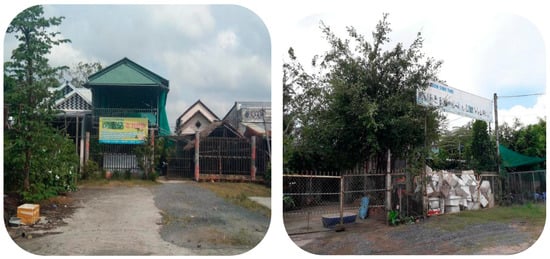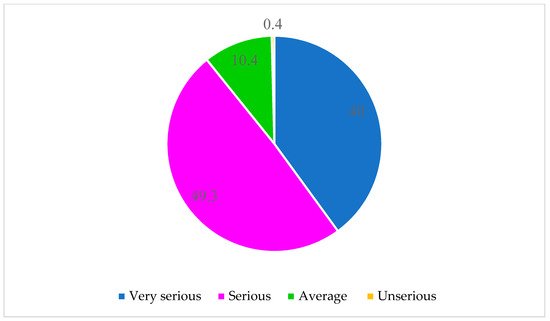1. How Serious Is It?
The COVID-19 pandemic has generally damaged the tourism industry in Can Tho city. The sharp decline in the number of customers, especially international visitors, has made many tourist service establishments close or suspend their business operations (Figure 1). Through the interviews with the representatives of the Department of Culture, Sports and Tourism of Can Tho City, about 20% of the tourism service businesses in the city and many tourism- and hospitality-related enterprises have had to close their businesses, which has also meant a huge loss in revenue (business, government, employees), loss of jobs, confusion and burden on society (businesses, employees) and negative impacts on local socio-economic development in both the short and long term (Figure 2).
Figure 1. Tourist attractions that stopped doing business during the COVID-19 pandemic. (Source: Photos taken by the research team, 2020).
Figure 2. The perceived impact of the COVID-19 pandemic on tourism service businesses in Can Tho. (Source: Enterprise manager interview data in Can Tho city, 2020).
The majority of the managers of tourism service businesses in this study believed that the COVID-19 pandemic has impacted local business either at a serious or very serious level, at 49.3% and 40%, respectively. According to the statistics, very few enterprises admitted that the COVID-19 pandemic has had moderate or non-serious impacts on their business, at 10.4% and 0.4%, respectively. This finding affirmed the serious impact of the pandemic on the tourism and hospitality industry (Panzone et al. 2021).
According to the data provided directly from the Department of Culture, Sports and Tourism of Can Tho City, the revenue of businesses has decreased significantly compared to the same period in 2019. More specifically, the revenue of accommodation establishments decreased on average from 50% to 90%, whereas the revenues of travel agencies and dining establishments decreased by 90% and around 60–90%, respectively.
The results of qualitative interviews with many stakeholders involved in the tourism business in Can Tho generally reflected their impuissant responses to the COVID-19 pandemic. The respondents stressed that the pandemic has caused a crisis in the tourism industry of Can Tho city, with extremely heavy losses. A representative of Can Tho City Tourism Association said:
“The COVID-19 pandemic has had a great impact on the tourism industry of Can Tho city, especially the travel agencies, accommodations, and tourist destinations and transport services. Many tourism businesses were on the brink of bankruptcy, causing employees losing their jobs and creating a burden for the society”.
In order to overcome difficulties during and after the pandemic, the findings from the survey indicated that all local business owners were aware of the importance of self-adjustment rather than dependence on the limited financial support from the government. Some common measures to deal with the pandemic consequences associated with renting premises, paying staff salaries and operating costs have been initiated. In this sense, a lot of companies chose to reduce staff numbers or close a part of their business temporarily, whereas the others adjusted their target markets and re-structured their tourism products or services. These are supposed to be temporary solutions for local businesses:
“We could not just sit there and wait for the financial support from the local and central government. Although we were first passive at the first wave of pandemic, we are now proactive to prepare possible scenarios and have our own measures. Indeed, we are lucky not to close our business but not sure if lockdowns or another wave of COVID-19 occurs”.
(A representative of a tourism enterprise in Can Tho city)
According to a representative of the Can Tho City Tourism Development Center, the COVID-19 pandemic has caused a domino effect in the entire tourism economy. As a result, a few surviving tourism enterprises have been unable to operate their business as usual due to a lack of other important suppliers.
“A half of the businesses in the area were temporarily closed; some businesses operated moderately, over 70% of workers in the tourism industry were affected and unemployed. they had to change their jobs. It can be said that COVID-19 has been stifling the tourism industry, not only in Can Tho city but also nationwide.”
According to the respondents, the domino effect of the pandemic crisis in Can Tho city almost froze its tourism economy, leading to devastating consequences. Evidently, around 63% of businesses in Can Tho city stopped operating; only 16% of businesses could remain open, but had to cut 14% of their operation scale and employees. On the other hand, with the consequences of the decline in customers and revenue, the remaining 7% of businesses had to dissolve when there was not enough funding to maintain operations. A representative of the local government of Cai Rang district projected a dark scenario for domestic tourism in the region:
“COVID-19 has been and will continue to be a huge challenge for the tourism industry in Can Tho in particular and the entire tourism industry in our country in general”. This has caused a great pressure on the social economy when the laborers lost their jobs, the socioeconomic burden increased rapidly, and the job creation problem was under pressure. From that we can see the impact of the pandemic on the tourism industry and the economy. I think that the epidemic crisis is extremely serious.”
2. COVID-19 Impact and the Vulnerability of Tourism Business Sectors
The research findings generally indicated differences in the impact of the COVID-19 pandemic on some tourism sectors and the types of tourism-related enterprises. Each type of tourism business with different business characteristics has been affected differently by the pandemic. The entry is to explore if there was any difference in the impact of the pandemic on business operations of the restaurants, accommodations, travel agencies, tourist destinations and family-owned tourist attractions. The results of data analysis by one-factor variance analysis showed that there was a statistically significant difference in the impact of the COVID-19 pandemic on some key business activities in terms of the percentage of customer decline, total decline, the proportion of revenue and the proportion of employee reduction (See Table 1).
Table 1. ANOVA results.
| Item |
df |
F |
p |
| Customer reduction |
Between Groups |
4 |
0.992 |
0.415 |
| Within Groups |
102 |
|
|
| Total |
106 |
|
|
| Percentage of customer reduction |
Between Groups |
4 |
7.339 |
0.000 |
| Within Groups |
274 |
|
|
| Total |
278 |
|
|
| Revenue reduction |
Between Groups |
4 |
2.466 |
0.052 |
| Within Groups |
79 |
|
|
| Total |
83 |
|
|
| Percentage of revenue reduction |
Between Groups |
4 |
4.041 |
0.003 |
| Within Groups |
257 |
|
|
| Total |
261 |
|
|
| Percentage of reduction in capacity of exploitation, property use and tourism services |
Between Groups |
4 |
1.665 |
0.158 |
| Within Groups |
263 |
|
|
| Total |
267 |
|
|
| Number of employees to be laid off |
Between Groups |
4 |
1.737 |
0.146 |
| Within Groups |
127 |
|
|
| Total |
131 |
|
|
| Percentage of employees to be laid off |
Between Groups |
4 |
11.133 |
0.000 |
| Within Groups |
127 |
|
|
| Total |
131 |
|
(Source: Enterprise manager interview data in Can Tho city, 2020).
According to Table 2, the COVID-19 pandemic has caused a decrease in the percentage of customers and the percentage of employees being laid off, differing from business to business. In terms of the proportion of customer decline, tourist fruit orchard houses were the most affected (68.5%), followed by other tourist attractions (67.8%). The other types of tourism businesses with smaller decreases in the number of customers than travel agencies made up 65.8%, compared to accommodation establishments and dining establishments at 58.4% and 53.4%, respectively. Regarding the proportion of employees being laid off, large tourism sites and family owned-tourist attractions were the two organizations with the greatest proportion of employees being laid off at 74.3% and 63%, respectively. The other tourism-related businesses including accommodation, tour operators and dinning establishment experienced similar impacts, at 46.4%, 39.5% and 39.2%, respectively.
Table 2. Differences of COVID-19 impacts on business performance of firms in Can Tho city.
| Item |
N |
Mean |
| Percentage of customer reduction |
Accommodation |
80 |
58.4 |
| |
Travel agency |
49 |
65.8 |
| |
Dining establishment |
50 |
53.4 |
| |
Tourist attraction |
70 |
67.8 |
| |
Tourism fruit orchard |
30 |
68.5 |
| Revenue reduction (VND millions) |
Accommodation |
20 |
2337.7 |
| |
Travel agency |
13 |
11,336.9 |
| |
Dining establishment |
9 |
1577.9 |
| |
Tourist attraction |
30 |
263.2 |
| |
Tourism fruit orchard |
12 |
240.5 |
| Percentage of revenue reduction |
Accommodation |
80 |
58.3 |
| |
Travel agency |
48 |
64.2 |
| |
Dining establishment |
48 |
54.7 |
| |
Tourist attraction |
63 |
66.5 |
| |
Tourism fruit orchard |
23 |
65.3 |
| Percentage of employees to be laid off |
Accommodation |
34 |
46.4 |
| |
Travel agency |
20 |
39.5 |
| |
Dining establishment |
40 |
39.2 |
| |
Tourist attraction |
28 |
74.3 |
| |
Tourism fruit orchard |
10 |
63.0 |
(Source: Data collected from interviewing tourism enterprises in Can Tho city, Vietnam, 2020).
The above findings generally indicate the decline in revenue for different types of businesses. Unexpectedly, tourist destinations and family-owned tourist attractions experienced the greatest decline in revenue at 66.5% and 65.3%, respectively. Meanwhile, 58.3% of accommodation establishments and 54.7% of food establishments witnessed a decrease in revenue. At 90% confidence, the revenue of different types of tourism business experienced different drops. The travel agencies, accommodation establishments, and food and beverage establishments were those with the greatest decrease in total revenue, at VND 11,336.9 million, VND 2337.9 million and VND 1577.9 million, respectively. Meanwhile, the tourist destinations and family-owned attractions saw relative declines in total revenue of VND 263.2 million and VND 240.5 million, respectively.







